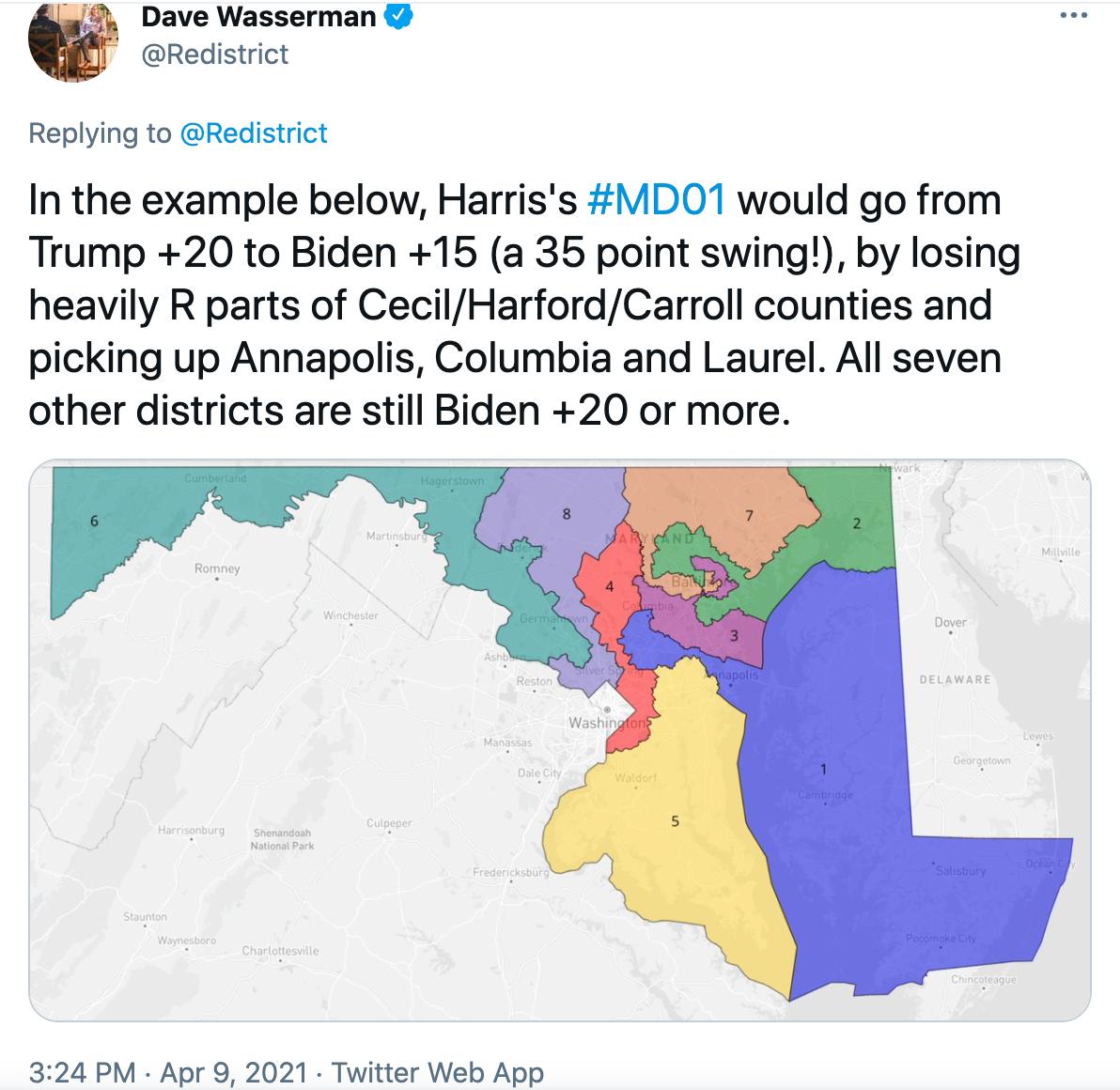Maryland’s General Assembly will have the final say over the state’s next set of congressional and legislative maps, and legislative leaders’ bipartisan redistricting commission held its first meeting Tuesday evening.
The Legislative Redistricting Advisory Commission, convened by Senate President Bill Ferguson (D-Baltimore City) and House Speaker Adrienne A. Jones (D-Baltimore County), will conduct public hearings before proposing congressional and legislative maps. Karl Aro, former executive director of the non-partisan Department of Legislative Services, is the commission’s chair.
The Department of Legislative Services will be responsible for drawing maps based on the commission’s input, Aro said. He said the map drafts will be confidential until the commission is ready to release its proposal to the public.
Jodie Chilson of the Department of Legislative Services said that any member of the General Assembly will be able to request a map be drawn.
“Any request that comes to us for that would be confidential even with respect to the commission,” Chilson said. “Once the map is drawn and you get it, you can do with it what you want, but as we’re drawing it that would be confidential.”
The departments of Planning and Legislative Services finalized data to be used for redistricting on Tuesday, Legislative Services Senior Policy Analyst Michelle Davis told members of the panel. The U.S. Census data used for redistricting was released last month, but state officials needed to adjust that data to comply with Maryland law, which requires that incarcerated people are counted as residents of their known address. She said that data will be available to the public soon.
Senate Minority Leader Bryan W. Simonaire (R-Anne Arundel), a member of the panel, pressed for a bipartisan map-drawing process, and said he hopes commission members work together when it comes to creating a single, cohesive map.
“We’re not in the majority and don’t pretend to be there, but I would like to be included as opposed to Republicans going off and doing their maps, Democrats going off and doing their maps,” he said.
Simonaire noted that after the 2010 Census, Gov. Martin O’Malley (D) created a redistricting commission to conduct public hearings, but according to depositions from the Benisek v. Lamone case, most map-drawing during that process was done away from the public eye by political operatives and incumbents.
“We ended up with some of the worst maps in the nation … especially on the congressional side,” Simonaire said.
Aro said he hopes the legislative commission will produce a map that makes people feel that their communities are largely kept whole, but warned that some areas will likely have to be split due to how complex the process is. He likened redistricting to “doing brain surgery with a sledge hammer.”
“My hope too is that the geography will look, for lack of a better word, prettier,” Aro said. “It should. I imagine we’ll just have to work our way through it.”
Ferguson said public input will be “absolutely essential” to the commission’s work and pledged a transparent process.
“We will have a fair and transparent process, and in order for that to happen we need to hear from the public,” Ferguson said.
Jones likewise underscored the importance of public input.
“For those Marylanders watching this online, we are asking you to show up at our hearings, write us letters, and send us your ideas,” Jones said. “We are listening.”
Jones also acknowledged that the redistricting debate likely won’t end when the General Assembly adopts maps.
“There’s a good chance that these maps will end up in court,” she said. “That is the nature of redistricting. We will follow the advice of counsel at every step, making sure that the rights of all Marylanders are protected.”
The Legislative Redistricting Advisory Commission will conduct region-based and statewide public hearings in the coming months, and will kick off with a public hearing in Prince George’s County on Monday, Sept. 20. The location of that meeting wasn’t immediately available, but the meeting will be live streamed.
Other lawmakers on the commission are Senate President Pro Tempore Melony Griffith (D-Prince George’s), House Majority Leader Eric Luedtke (D-Montgomery) and House Minority Leader Jason Buckel (R-Allegany).
The Legislative Redistricting Advisory Commission is one of two panels tasked with conducting public hearings and drawing up a proposed set of congressional and legislative maps in the coming months: Gov. Lawrence J. Hogan Jr. (R) created the Maryland Citizens Redistricting Commission earlier this year to create maps that he will propose to the General Assembly.
That commission includes three Republicans, three Democrats and three unaffiliated voters, and completed one round of public hearings before the release of U.S. Census data in August.
Hogan plans to introduce both the congressional and legislative maps that are drawn by the Maryland Citizens Redistricting Commission. The governor is required to introduce legislative maps, but statutes are silent on who is responsible for introducing congressional maps. The General Assembly is allowed to make changes to those maps and draw their own.
While both commissions are tasked with drawing up maps, the ultimate authority for mapmaking in Maryland rests with the General Assembly, where Democrats hold a veto-proof majority in both the House of Delegates and the Senate.
Hogan can veto only congressional maps, although lawmakers easily overrode his vetoes on such measures as police and education reform during the 2021 legislative session. He can’t veto the General Assembly’s legislative maps, but his proposed maps would become law if the General Assembly doesn’t pass a redistricting plan within the first half of the 2022 legislative session.
At a media briefing ahead of the legislative panel’s first meeting Tuesday, Simonaire and Buckel reiterated their support for Hogan’s Maryland Citizens Redistricting Commission.
“The best way to do redistricting is in a bipartisan or nonpartisan fashion, letting the citizens drive the redistricting process rather than the politicians in the back room,” Buckel said.
Simonaire previously predicted that the legislative commission’s final vote would come down to a party-line split. He said Tuesday that he remains “skeptical” of the legislative redistricting commission.
Congressional maps could be adopted by the General Assembly later this year, with legislative leaders considering a special session in December to tackle congressional redistricting.
By Bennett Leckrone





